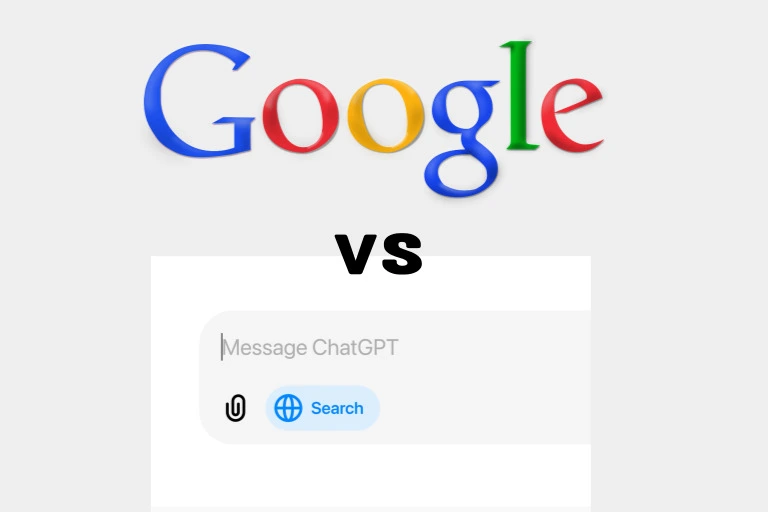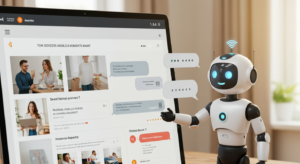Introduction
The search engine landscape is undergoing a seismic shift with the rise of AI-powered tools like ChatGPT Search. OpenAI recently announced that ChatGPT Search, previously exclusive to paid users, is now available for free to all users. This move democratizes access to conversational AI-driven search, potentially disrupting traditional search engines like Google. As ChatGPT gains traction, it raises questions about its impact on Google’s dominance and the broader search market.
Table of Contents

ChatGPT Search: Now Free for All Users
OpenAI’s decision to make ChatGPT Search free marks a pivotal moment in the evolution of AI-powered search. Previously limited to paid subscribers, this feature now allows anyone with a ChatGPT account to access real-time search capabilities. Users can query natural language prompts and receive concise, conversational answers enriched with citations and multimedia elements like maps and images.
Key updates include:
Real-Time Results: ChatGPT now fetches up-to-date information from the web.
Enhanced Mobile Experience: Features like local business searches with maps and ratings improve usability on mobile devices.
Browser Integration: Users can set ChatGPT as their default search engine via browser extensions.
This accessibility positions ChatGPT Search as a direct competitor to Google, especially among younger, tech-savvy demographics.
How Does ChatGPT Compare to Google?
ChatGPT Search offers a fundamentally different experience compared to Google’s traditional search engine. Here’s a quick comparison:
| Feature | ChatGPT Search | Google Search |
|---|---|---|
| Response Style | Conversational, summarized answers | Ranked list of links |
| Real-Time Data | Available for free users | Comprehensive and live |
| Ad Integration | No ads (currently) | Ad-heavy results |
| User Interface | Interactive chat | Static search results |
While Google excels in breadth and depth of indexed content, ChatGPT’s conversational approach appeals to users seeking direct answers without sifting through multiple links.
The Impact on Google’s Market Share
Google remains the dominant player in the search market, holding over 91% global market share as of late 2023. However, recent surveys reveal that ChatGPT is gaining ground. For example:
In a survey by Evercore ISI, 5% of respondents identified ChatGPT as their primary search tool, up from 1% six months prior.
Millennials are driving much of this adoption due to their preference for conversational interfaces and AI-driven tools.
Despite these gains, analysts argue that ChatGPT has yet to make a significant dent in Google’s traffic. With only 2% of Google’s monthly traffic volume, ChatGPT is more likely supplementing traditional search rather than replacing it entirely.
Challenges for Google: Ad Revenue and User Behavior
Google’s ad revenue model faces potential disruption from tools like ChatGPT. Unlike traditional search engines that display ads alongside results, ChatGPT provides single-answer responses, reducing opportunities for ad placements. This shift could force Google to innovate its monetization strategies.
Moreover, as user behavior evolves toward conversational queries, businesses must adapt their SEO strategies. Traditional keyword optimization may give way to intent-based content creation designed for AI-driven platforms like ChatGPT.
Advantages of ChatGPT Search’s Free Tier
The rollout of a free tier significantly enhances ChatGPT’s competitive positioning by:
Attracting New Users: Free access lowers barriers for adoption.
Expanding Use Cases: From casual searches to professional research, users can leverage AI capabilities without subscription fees.
Driving Innovation: Features like voice integration and multimedia-rich responses cater to modern user expectations.
These advantages could accelerate the shift in user preferences toward AI-powered search tools.
Limitations of ChatGPT vs. Google
Despite its innovations, ChatGPT faces several challenges:
Real-Time Accuracy: While improved, its reliance on external data sources can lead to inconsistencies.
Niche Queries: Google still outperforms in highly specific or obscure searches.
Trust and Verification: Users may hesitate to rely solely on AI-generated responses without cross-referencing credible sources.
These limitations highlight why Google remains indispensable for many users.
The Future of Search: Coexistence or Competition?
The rise of generative AI tools like ChatGPT signals a transformative era for online information retrieval. While Google continues to dominate, its integration of AI features (e.g., Bard and Gemini) demonstrates its commitment to staying ahead of the curve. Meanwhile, OpenAI’s aggressive push into the free-tier market underscores its ambition to challenge traditional models.
For now, it seems likely that both platforms will coexist, catering to different user needs—Google for comprehensive searches and navigation; ChatGPT for personalized, conversational queries.
Conclusion
The introduction of a free tier for ChatGPT Search marks a bold step in reshaping the search engine landscape, challenging Google’s long-standing dominance while opening new possibilities for how we access information. As user preferences evolve toward conversational interfaces and real-time results, businesses and marketers must adapt their strategies to thrive in this AI-driven ecosystem.
Whether you’re team Google or team ChatGPT—or somewhere in between—one thing is clear: the future of search is here, and it’s powered by AI.




